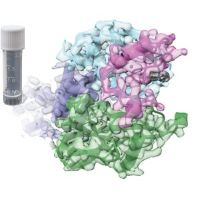Specification
| Description | Recombinant protein from the full-length sequence of Homo sapiens coiled-coil domain containing 134 (CCDC134), transcript variant 1 (NM_024821). |
| Organism | Homo sapiens (Human) |
| Expression Host | Human Cells |
| Tag Info | His or DYKDDDDK. Please contact us if you need further information or require specific designed tag. |
| Purity | Greater than 90% by SDS-PAGE gel |
| Uniprot ID | Q9H6E4 |
| Entry Name | CC134_HUMAN |
| Gene Names | CCDC134 |
| Alternative Gene Names | |
| Alternative Protein Names | Coiled-coil domain-containing protein 134 |
| Application | Antigens, Western, ELISA and other in vitro binding or in vivo functional assays, and protein-protein interaction studies; For research & development use only! |
| Buffer | Purified protein formulated in a sterile solution of PBS buffer, pH7.2, without any preservatives |
| Endotoxin | Endotoxin level is < 0.1 ng/µg of protein (<1EU /µg) |
| Length | 229 |
| Molecular Weight(Da) | 26561 |
| Protein Sequence | (The sequence of expressed protein may have some variation from the sequence shown below. Please contact us for the exact sequence.) MDLLQFLAFLFVLLLSGMGATGTLRTSLDPSLEIYKKMFEVKRREQLLALKNLAQLNDIHQQYKILDVMLKGLFKVLEDSRTVLTAADVLPDGPFPQDEKLKDAFSHVVENTAFFGDVVLRFPRIVHYYFDHNSNWNLLIRWGISFCNQTGVFNQGPHSPILSLMAQELGISEKDSNFQNPFKIDRTEFIPSTDPFQKALREEEKRRKKEEKRKEIRKGPRISRSQSEL |
Background
| Function | FUNCTION: In extracellular secreted form, promotes proliferation and activation of CD8(+) T cells, suggesting a cytokine-like function (PubMed:25125657). Enhances cytotoxic anti-tumor activity of CD8(+) T cells (PubMed:25125657). May inhibit ERK and JNK signaling activity (PubMed:18087676, PubMed:23070808). May suppress cell migration and invasion activity, via its effects on ERK and JNK signaling (PubMed:23070808). {ECO:0000269|PubMed:18087676, ECO:0000269|PubMed:23070808, ECO:0000269|PubMed:25125657}.; FUNCTION: In the nucleus, enhances stability of the PCAF histone acetyltransferase (HAT) complex member TADA2A and thus promotes PCAF-mediated H3K14 and H4K8 HAT activity. May inhibit TADA2A-mediated TP53/p53 'Lys-321' acetylation, leading to reduced TP53 stability and transcriptional activity. May also promote TADA2A-mediated XRCC6 acetylation thus facilitating cell apoptosis in response to DNA damage. {ECO:0000269|PubMed:22644376}. |
| Pathway | |
| Protein Families | CCDC134 family |
| Tissue Specificity | Expressed in cervical gland, cervical squamous epithelium, endometrium, stomach, kidney distal convoluted tubule, spermatogenic cells in testis, mammary gland, liver and striated muscle (at protein level) (PubMed:18087676, PubMed:23070808). Also detected in placenta (PubMed:18087676). Highest expression in testis relative to other tissues (PubMed:18087676). Detected in T cells and dendritic cells; highly expressed in activated CD8(+) T cells, and also expressed at lower levels in CD4(+) T cells (PubMed:25125657). {ECO:0000269|PubMed:18087676, ECO:0000269|PubMed:23070808, ECO:0000269|PubMed:25125657}. |
QC Data
| Note | Please contact us for QC Data |
| Product Image (Reference Only) |  |

